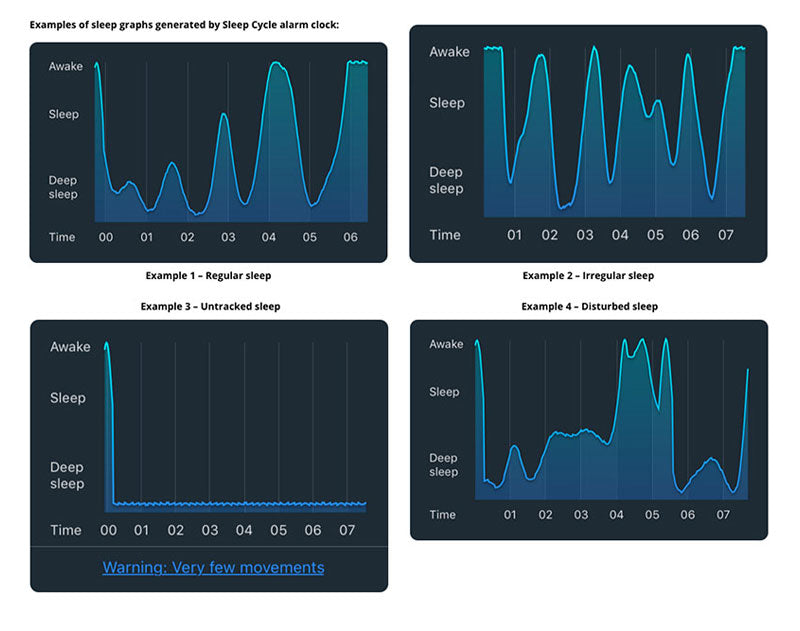
By Lincoln Eather
If you’re like me and dream of dreaming more, the idea of a sleep cycle app is enticing. Everyone wants more sleep—just look at research showing we're not getting enough. Whether we’re staring at too many screens, working too hard or eating too much before bed, we can all use a little help getting more shuteye.
We previously shared a few tips for developing better sleep habits. Now we'll take a look at one way to test if those habits are working with the most popular sleep tracker on the market, Sleep Cycle, and see if it's worth working into your routine.
How Sleep Cycle Works

Sleep Cycle primarily functions as an "intelligent alarm clock" that promises to wake you up during your lightest sleep phase. Anyone who has ever been jolted awake by an alarm (i.e. everyone) knows that groggy feeling of having your dreams interrupted, versus the restful feeling of waking up on your own schedule.
Anyone who has ever been jolted awake by an alarm (i.e. everyone) knows that groggy feeling of having your dreams interrupted, versus the restful feeling of waking up on your own schedule
To use Sleep Cycle, you set an alarm for the absolute latest you want to wake up, plug in your smartphone and place it under your pillow or on the nightstand before bed. As we sleep, we naturally flow between phases of deep sleep and light sleep. The app measures your movement and noise throughout the night using the sensors in your phone to determine which sleep phase you're going through.
Sleep Cycle will try to trigger the alarm during your lightest sleep cycle within 30 minutes before the time you set to be woken up. For example, if you set your alarm for 7:30, the app will monitor your movement and turn on the alarm when you're the most restless between 7:00 and 7:30. This, so we’re told, is the natural way to wake up and will have you feeling more rested when it's time to get out of bed.
Sleep Cycle also keeps track of your sleep phases throughout the night to help you track your sleeping habits, such as the average amount of sleep you're getting each night and how behaviors such as drinking coffee or eating a big meal before bed affect your sleep quality.
Experience Using The App

The app is very customizable and there are a few ways to extend its use. I’ve even read about some people pairing it with smart light bulbs so they get woken at the right time and the lights come on slowly. That’s kinda bad ass, though a full tech cycle beyond my needs, so I simply tried it next to my pillow…
And, unfortunately, I didn’t really like it.
Initially I thought it was the best thing since sliced bread—not that I really experienced life before sliced bread, but you get where I’m going. This wonderful app told me when I slept, when I was restless, and when to wake up. The goal of actually sleeping well was attainable (I’m generally a terrible sleeper, averaging 3-5 hours a night of broken sleep) and at the beginning I was super excited to go to bed, wake up and learn all about my sleep.
The graphs are intoxicating. You see all the ups and downs, the deep sleep, the light sleep, how long, etc. And it’s really quite fascinating that you can pull this much information about your sleep from your phone.
It was fun to try out, but I don’t think an app is going to change my sleeping habits overnight, or in the long term without some other complementary behavioural changes
Unfortunately, for me anyway, was that the more data it pulled in the more anxious I got about how much sleep I was getting, especially when the app told me I had a bad night. Like, if I didn’t sleep well I'd hear that nagging voice telling I’m going to be so tired all day, yada, yada, yada. Whereas previously even if I didn’t sleep well, but was in bed for X amount of hours, I could convince myself I did OK. This just threw the dream of better sleep right in my face. It was fun to try out, but I don’t think an app is going to change my sleeping habits overnight, or in the long term without some other complementary behavioural changes.
And so after a while I stopped using the app and instead attempted to be more serious about my preparation before bed with things like less screen time, temperature adjustments and eating dinner as early as possible. Personally, I found the best results if I only had a smoothie around 6pm.
Conclusion
It felt like if I got completely into the overall fitness mentality with my phone—food, activity, sleep, etc.—I could have gotten more out of it. Sleep Cycle receives rave reviews on the App Store, so it obviously works for many people. It's worth giving it a try, especially if you're a data nut. Even if you’re not, it’s a free app, so it’s worth downloading and giving it a test run. If you dig it, you can upgrade via an in-app subscription for $1.99/month or $9.99/year.
Pros
- Getting detailed feedback on sleeping habits
- Gently eases you awake
Cons
- Sleep Anxiety
- No reminder to start it every night
Where to Download
Bonus Tips
Generally, people go through 90-minute sleep cycles. Next time you wake up before you're alarm, if it’s inside of 90 minutes until you're supposed to get up, try to make yourself get out of bed and start going after the day. You’ll be amped with the extra time.
If you're interested in reading more about attaining better sleep, hit up these links:
- How many hours of sleep you need?
- Short sleepers are more likely to catch cold
- Some people need very little sleep

